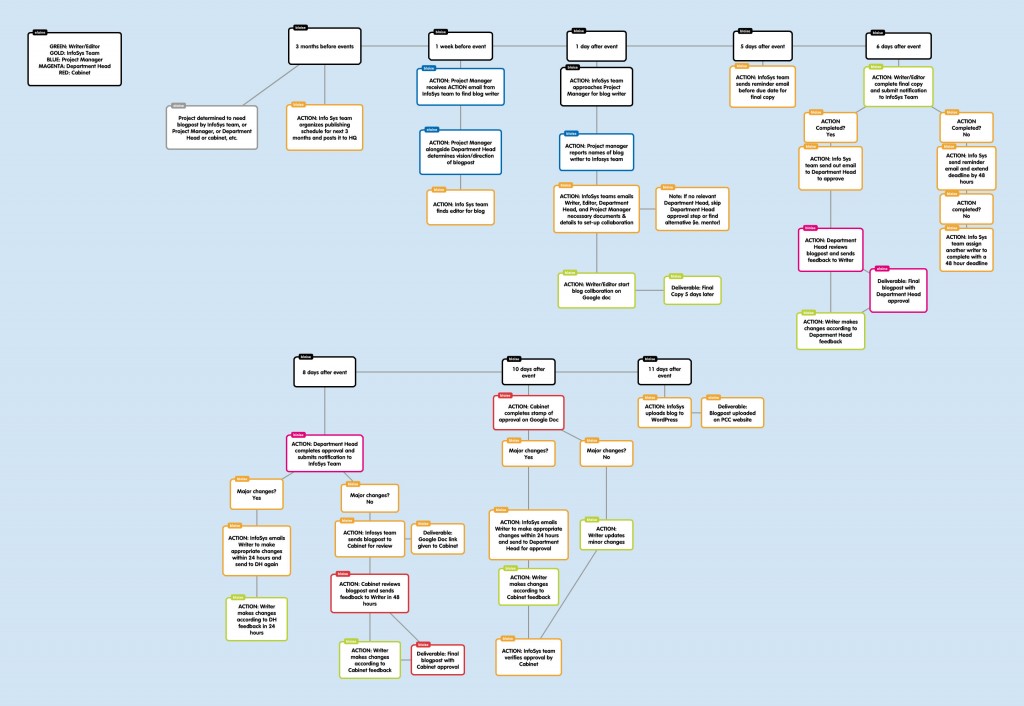Written By: Blaise Wong
Managing people is daunting enough for me; but managing a team in Vancouver while in Toronto sounds even harder. Fortunately, we live in a day and age where those kilometres are just numbers instead of an insurmountable distance. I haven’t been in Vancouver since January, and the 180th Pacific Coast Scout Group (180th Scout Group) has grown seemingly exponentially since then, so a lot of the newer folks probably haven’t even seen my face! For everyone’s benefit, I am a Core member of the Information Systems team (InfoSys) in the 180th Pacific Coast Scout Group. Interestingly, half of our four-person team is currently in Ontario, but we are still finding ways to contribute using the various communication technologies available to us.

The objective of the InfoSys team is to work on the processes that work behind the scenes. One of our main focuses in the last year has been the uploading of blog posts to our website, and the creation of a formalized Blog Process. Elaine Au is the driver of our blog uploads, and despite her being in Ottawa and me being in Toronto, we’ve been given the opportunity to continuously contribute to the group with the help of the various communication technologies online. This isn’t to say that we haven’t had our fair share of challenges.
When communicating with so many different people over the Internet, projects do have a tendency to spiral out of control, miss their deadlines, and turn into an extremely disorganized mess, even with our ability to send messages instantly. Lessons in project management can be learned from these though, and it’s helped us immensely when creating the Blog Process. Often times deadlines are missed during the back and forth between having someone approve the blog for upload, and having the writer make specified changes; however, from experience, some tweaks in our email instructions, and some diligence, we have found out how to manage our timelines in our digital, and “3-hours-ahead” environment.
The Blog Process itself is essentially a preset timeline and management outline we created out of the lessons we learned, and we organized those into a new flowchart application that we discovered: Popplet. I recommend any new Rovers looking looking to hone their project management skills to try managing a blog upload. Give us a shout, we won’t bite!

Our lifesaver has been Google which has given us out-of-towners amazing reach for helping out the group. Not that I want to make this paragraph an advertising piece, but as I sit here typing out this blog on a Google doc that will eventually make its way to editors and approvers on a timeline set on a Google calendar, initially assigned from a meeting on Google Hangouts, and all on a PCC Gmail account that sends notifications to my Google phone, I can’t help but wonder whether such a thing was even possible two years ago? It probably was, but the integration of everything into one accessible service is what makes the difference. Thanks to Google Hangouts and its scheduling system, we have been able to communicate frequently with people in Vancouver.
For instance, we have been able to hold weekly meetings with the 180th’s Communications Team with surprising consistency. When people are invited to meetings using Google Calendars, the meeting date and time is automatically set in everyone’s calendar, and with the correct time zone to boot! During these meetings we share meeting minutes using Google Docs which allows collaboration on a single document in real time. Everyone gets them instantly; no wandering around a database trying to find an agenda from last night. When Google hasn’t been able to get it done however, there is a wealth of other programs available at our disposal, and Doodle is one such tool. Doodle allows easy scheduling for large groups of people so that everyone can pinpoint their preferred meeting date. All I have to do is set up a poll, send a link to all the participants, and wait for the results. No registration required, and it also syncs to Google’s calendar. Neat!

Google Hangouts is a very widespread video conferencing technology, and it gives the Rover Scouts, that aren’t in Vancouver, faces to interact with – a lot more effective than an email or a telephone call. These burgeoning technologies have not only helped me to communicate with my fellow team members more easily whether they be in Ottawa or Vancouver, but it has also allowed me to participate in the 180th Scout Group’s monthly meetings. Working like this has given me a lot of insight into the potential for this technology, and perhaps in the future we may even stream part of our monthly meetings!
I am very thankful for the faith that my various team mates have put in me while I am so far away. That I am still able to contribute, whether it be for an InfoSys process, a blog upload, or a Communication Team meeting, is truly a testament to how inclusive the group strives to be. However, it’s worth noting that people working far from their base of operations is becoming more common in the current industry: as the world globalizes, these integrated communication technologies become key. Those that learn how to use it in both the technical and management sense will have a head start. Back last January, it was unknown whether I would have been able to stay engaged with the crew, or continue to be involved in projects; however, with all these tools, and with some help from my fellow Rover friends across Canada, I’ve consistently been able to contribute, and hopefully I will not falter anytime soon.